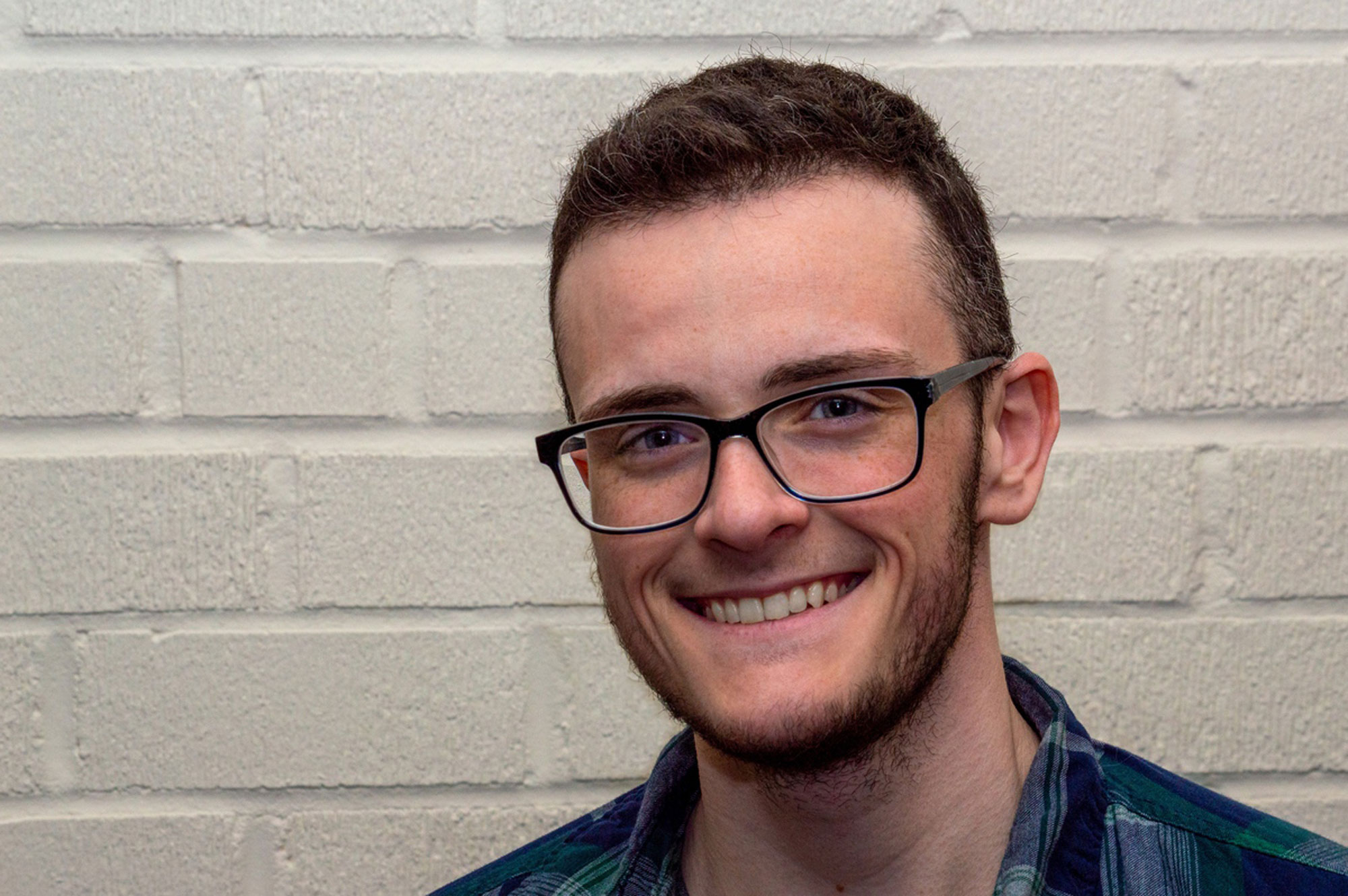How Testosterone Changes the Voices of Trans Men

Graham Grail dedicated his undergraduate research to investigating vocal changes in transgender men, after noticing a huge lack in research. He hopes his study will have a positive impact on the trans community at large. Photo courtesy of Graham Grail
How Testosterone Changes the Voices of Trans Men
In a first-of-its-kind study, led by a then–BU undergrad, trans men undergoing “T therapy” report that a masculine voice is of utmost importance to their identity
In spring 2015, Graham Grail, then a sophomore at Boston University, approached one of his professors with an idea. One day after class, he walked up to Carolyn Hodges-Simeon’s podium and explained that he wanted to research voice, specifically how it changes in transgender men who take testosterone. Hodges-Simeon, a biological anthropologist who researches sex differences in speech and the voice, was immediately on board.
“I was very surprised to see that at the time there was so little research in this area, and it got me thinking, how do physicians know the proper dosage? How do people starting testosterone therapy know what to expect?” says Hodges-Simeon, a BU College of Arts & Sciences assistant professor of anthropology.
Grail had personally encountered the impact of those knowledge gaps, and he felt motivated to find answers that would be meaningful for himself and the trans community at large. When he first came out as trans, Grail knew that his voice was one of the most important physical changes that he wanted from starting testosterone (T) therapy. He did his research, but was still left with unanswered questions and concerns that seemed to be echoed by others throughout the trans community.
“When you go to your doctor, all they can really tell you is that your voice will change—most likely—and it will probably get lower…but besides that, that’s all we know,” Grail says. “And I like to know everything.”

Six years since they first talked after class that day, Grail, Hodges-Simeon, and a team of research collaborators have published the first study to delve into the subtle effects—beyond vocal pitch—that T therapy has on voice. Their findings appear in Scientific Reports. They also found, in their interviews with trans men undergoing T therapy, that the voice is one of the most profound and important physical changes they experience.
“The voice is one of the aspects of the body that is most sexually dimorphic,” Hodges-Simeon says. In other words, the average difference in the sound of the voice between men and women is very large, unlike the average difference in, say, height—there are a lot of tall women and tall men, shorter women and shorter men, and many who fall in between. But when it comes to the voice, gender differences are more distinct, and there are fewer people who fall outside of the average.
In their study, Grail recruited 30 trans men from the Boston area who had been on T for nine months or more. Over a two-day period, the study participants provided saliva samples, voice recordings, and other physical measurements, and completed a survey asking questions about their gender identity, and importantly, about which physical characteristics they were most content or dissatisfied with before and after starting T. From the survey results, the researchers found that across the board, voice was rated most highly as something they wanted to see change from T therapy, ranking the highest out of the other physical traits included on the survey.
“The thing people indicated they were most unhappy with prior to starting T was their voice and other highly sexually dimorphic traits, which makes sense because those are things people use to gender you,” says Grail. “And since bringing your gender presentation in alignment with your identity is the goal, the traits that most strongly signal gender presentation are often going to be the most impactful. We showed that is in fact the case.”
The voice, as opposed to being a pure tone, has many layers. The most obvious one we hear is the pitch of someone’s voice, made up of what’s called the fundamental frequency. This corresponds to the vibrations of the vocal folds, like the strings on a violin, Hodges-Simeon says. The more subtle layers are the vocal formants, which are like the resonating sounds that would bounce around in the body of the violin. Vocal formants are determined by the length of the vocal tract, which is larger on average in those who are natally male and therefore makes a deeper sound. To analyze the collected vocal samples, Hodges-Simeon and Grail partnered with researchers in BU’s Stepp Lab for Sensorimotor Rehabilitation Engineering, led by Cara Stepp, a BU College of Health and Rehabilitation Sciences: Sargent College associate professor of speech, language, and hearing sciences.
“We found that testosterone does a very successful job at bringing the voice into the average cis male range,” Hodges-Simeon says, cis meaning a person who identifies with the gender they were assigned at birth. But, they found T didn’t fully masculinize the more subtle sounds in the vocal formants, she says.
“This underscores the need for more treatment options and that, when it’s a priority, the voice needs to be more closely monitored,” Grail says. “There should be more of an open consideration of adding in voice therapy within a treatment plan, because the assumption right now is that T is going to do the job all by itself.”
Despite this discrepancy, most of the participants in the study rated vocal masculinity as one of the physical characteristics that they were most satisfied with after being on testosterone for more than nine months.
“That is a hopeful tidbit that’s really important to decreasing some of the unnerving uncertainty for people just going into this process,” Grail says. About a year before he kicked off his research collaboration with Hodges-Simeon, Grail founded BU’s Trans Listening Circle, a group for trans students to find community and advocate for gender-inclusive changes on campus. In 2018, he graduated from CAS and BU’s Wheelock College of Education & Human Development with a dual degree in anthropology and deaf studies, as well as a minor in biology. Grail is now pursuing a master’s in crime scene investigation at George Washington University. He plans to apply to medical school next year.
“Graham, as the incredibly bright student that he is, was able to pull together our expertise to address a problem in his community and bring this project to life,” says Hodges-Simeon. She and Stepp are working to revise a grant to continue researching voice change in trans men and hope this line of research continues.
“I never expected that I would find things that are so clear and powerful,” Grail says. “To find them in an empirical way that can positively impact the trans community—I am very grateful for that.”
This research was supported by a Natural Sciences and Engineering Research Council of Canada Discovery Development Grant.

Comments & Discussion
Boston University moderates comments to facilitate an informed, substantive, civil conversation. Abusive, profane, self-promotional, misleading, incoherent or off-topic comments will be rejected. Moderators are staffed during regular business hours (EST) and can only accept comments written in English. Statistics or facts must include a citation or a link to the citation.